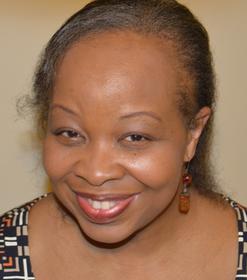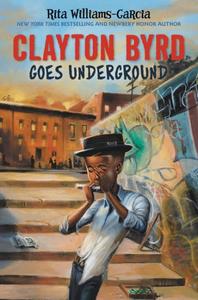
Rita Williams-Garcia is the author of novels for young adults and middle grade readers. The spell was cast early when her mother gave her wooden alphabet blocks, and her sister Rosalind slid picture books to her through crib slats. By age 12, she was learning how to prepare and send manuscripts to publishers and writing 500 words a night in preparation for her life as a writer. Known for her 1960s trilogy based on the Gaither sisters, who first appear in One Crazy Summer, Williams-Garcia decided it was time to switch gears and write a male-centered middle grade novel. In Clayton Byrd Goes Underground (Amistad Press, May 9, 2017), "the blues meets old school hip-hop" when grieving Clayton runs away from home. Armed with a harmonica and the words of his grandfather, Clayton plays a blues song of his own.
On your nightstand now:
At Fault by Kate Chopin. Whether it's for my picture book Bottle Cap Boys Dancing on Royal Street, or when I'm trying to perfect my gumbo, I'm always dreaming of Louisiana in one form or another. Right now, I'm reading At Fault, as well as revisiting Chopin's The Awakening and a few short stories to get the manner, mores and self-determination of women of a certain class in 19th-century Louisiana. At Fault was either panned or ignored during its day, but I glean a lot from it.
Favorite book when you were a child:
31 Brothers and Sisters by Reba Paef Mirsky was a godsend when I was a kid. Nomusa, daughter of a Zulu chief, was dark skinned, had short hair and went on the hunt with her father, which was unheard of. Pair Nomusa with a girl, same description, who shined her dad's army boots and watched boxing and football with him, and we're staring at my mirror! Published in the 1950s, there was no one else like Nomusa in books. I am forever grateful my school librarian put this book in my hands.
Your top five authors:
Toni Morrison was at the top of a survey I'd given myself when I finished college. As much as I was glad to be done with the dead white guys and gals, I learned to appreciate Faulkner, D.H. Lawrence and Virginia Woolf as I sank my teeth into Morrison. I learned to read like a writer.
Zora Neale Hurston knew my people. Not personally. She never laid eyes on them, but her larger than life depictions and even the softer souls were from stories my grandmother had told us about long gone relatives.
Ntozake Shange changed everything for me! She changed the way I heard and looked at text. It was as though words had teeth, womb and a spirit. I devoured for colored girls who have considered suicide / when the rainbow was enuf, Betsey Brown and Sassafrass, Cypress & Indigo. After having been in school for what seemed an eternity, I marveled at every page and thought, Can you do this?
Jacqueline Woodson has a permanent spot on my nightstand. You know how you take two pills and call the doctor in the morning? I self-prescribe Woodson before bed for whatever ails my writing, from clunkiness to superficiality. I wake up ready to rewrite.
Kate DiCamillo can tell a story! Whether the fictional plain is fanciful or down-to-earth. I reserve rereads of Kate DiCamillo's work as special treats when I need to be enchanted.
I like male authors too. I do! But you asked for my top five.
Book you've faked reading:
Watership Down by Richard Adams. Even though it was the hot new book and I was assured I'd like it because I liked Tolkien, I just didn't have the patience for it in high school. Not when there was Piri Thomas's Down these Mean Streets and scads of knitting books. Survival of the rabbit kingdom? Really? Fast-forward four decades. I'd just finished what I hoped was the final draft of my sci-fi-ish novel The Place of All Games (still working on it). Watership Down was on my list of recommended reads suggested by my VCFA colleagues. Forty years later, I got into the language, the lore and the hierarchy. Who knew?  Book you're an evangelist for:
Book you're an evangelist for:
The Sun Is Also a Star by Nicola Yoon. She does everything right! And of course, The Hate U Give by Angie Thomas, which is more than necessary. It's a bridge against the wall.
Book you've bought for the cover:
The Heart Has Its Reasons by María Dueñas. A betrayed college professor relocates to rebuild her life and take on the onerous research of a deceased literary figure. I hoped for a little heartbreak and the kind of immersive reading about university culture that would change the way I saw academic passion after having been around doctoral candidates. Halfway in, I thought, "The ex-husband had his reasons."
Book you hid from your parents:
The Catcher in the Rye. I was 13, reading Erich Segal's Love Story, Harold Robbins's The Carpetbaggers and Ayn Rand's The Fountainhead out in the open. No one said a thing. But when my older sister said her class was assigned The Catcher in the Rye, my father put his foot down. "You should read the classics like Ivanhoe." (I can't forget him saying that.) I must have read Catcher in one night by flashlight.
Book that changed your life:
for colored girls who have considered suicide / when the rainbow was enuf by Ntozake Shange. I sat inside the Booth Theatre on Broadway watching this play as a junior in college. It wasn't until I bought the book and saw the arrangement of the words, the smallness of them--and yet heard their screams and testimonies--that I thought, "This is big!" During the '70s and '80s, Ntozake Shange's work was critiqued as the work that epitomized the war between black women and black men. Instead of joining in the debate--mainly between my sorority and a fraternity--I studied its form and Ntozake's choices.
Favorite line from a book:
"Don't love nothing," spoken by ex-slave Ella in Toni Morrison's Beloved, when she first lays eyes on Seethe's newly born baby. This line reverberates through other Morrison novels, The Bluest Eye, Paradise, A Mercy, and on and on. It's both a dare and a warning, but in the grand scheme, an illumination.
Five books you'll never part with:
Charms for the Easy Life by Kaye Gibbons. I loved it some 20 years ago when my friend Sharyn November passed it to me, and I love it now. There's something about unvarnished folk that clings to the soul. The matriarch, Charlie Kate, is as down to the bone as they come. And of course, there's all those natural healing recipes. Trust me; if I have an ailment, I'm shaking out herbs for a healing tea.
Feathers by Jacqueline Woodson. Forget the glorious prose Jackie spins in the '70s backdrop of urban decay. Every time I read this book, I just know the Jesus Boy will in fact turn out to be Jesus. My heart becomes a hopeful 10-year-old's heart.
The Bible. There is so much in these hotel Gideon leave-behinds, but I read the Bible daily. Ecclesiastes goes a long way with me. I'm sure it's how I've learned to laugh as an adult.
The Tiger Rising. I love how Kate DiCamillo paints hardscrabble childhood. I feel those textures, from scars to about-to-fall-cigarette ash. And that Sistine Bailey is a sidewinder in a chiffon dress!
Beloved by Toni Morrison is the book I read from time to time to learn more about my own growth. Beloved opens, closes and reopens each time I read it. Sometimes I read it as a technician. Sometimes, as I wander through life. The reader in me is always enthralled, horrified and enlightened.
Book you most want to read again for the first time:
Their Eyes Were Watching God. This was probably the first romance of self for the black woman in America, but it was also the first romantic depiction between black woman and man that I had read. Through it, I first fell in love with the poetry on the page. But it also helped me to think about the balance between humanism and sentiment. Their Eyes Were Watching God made me strive to write truer and to resist myself when necessary.

